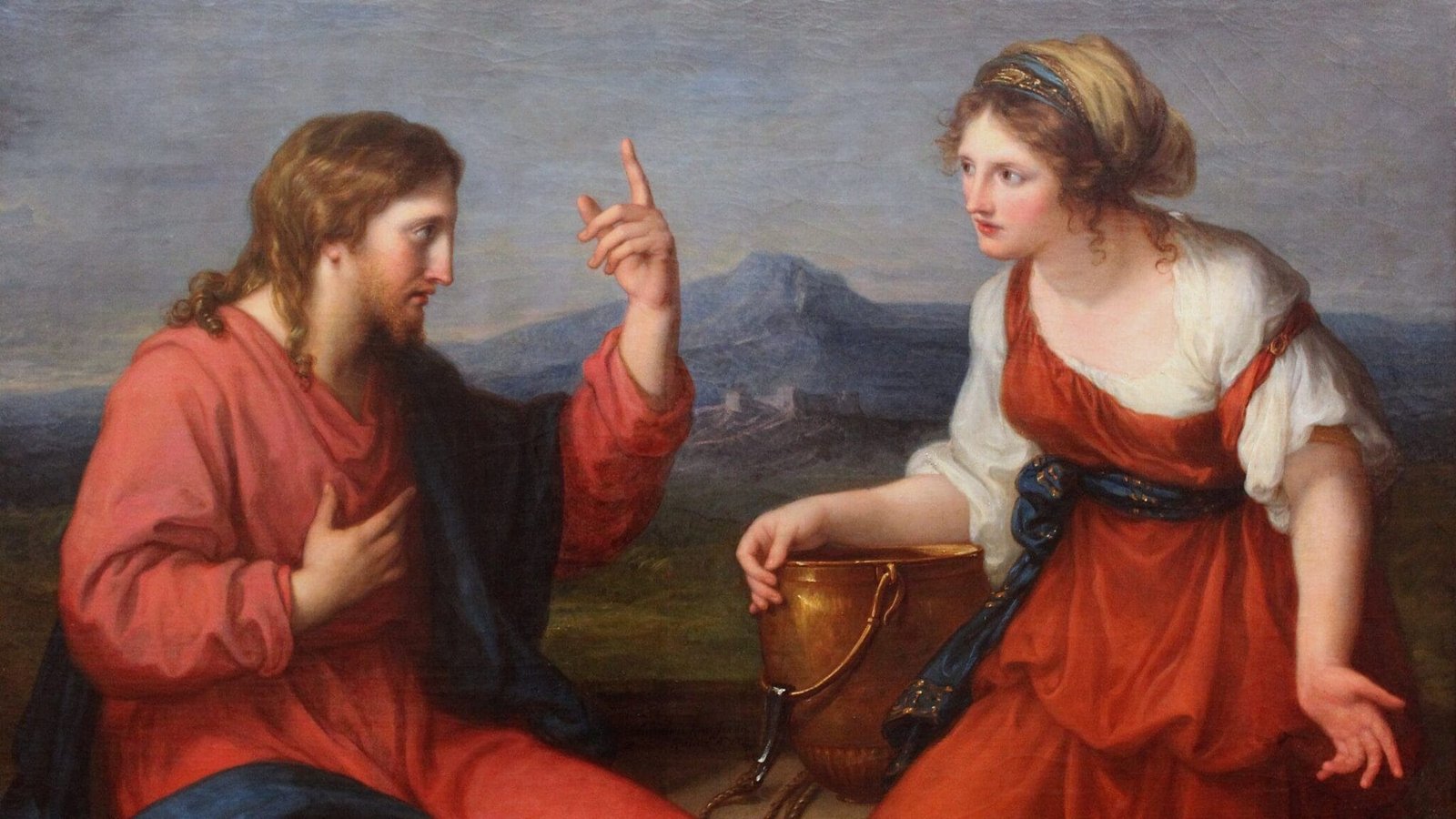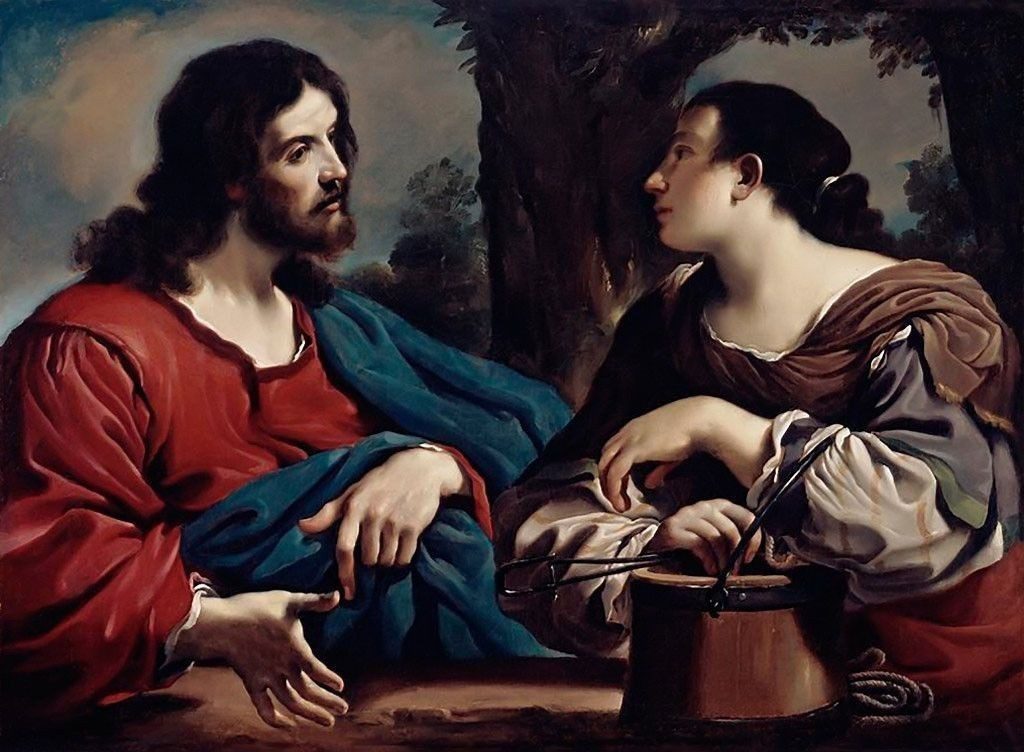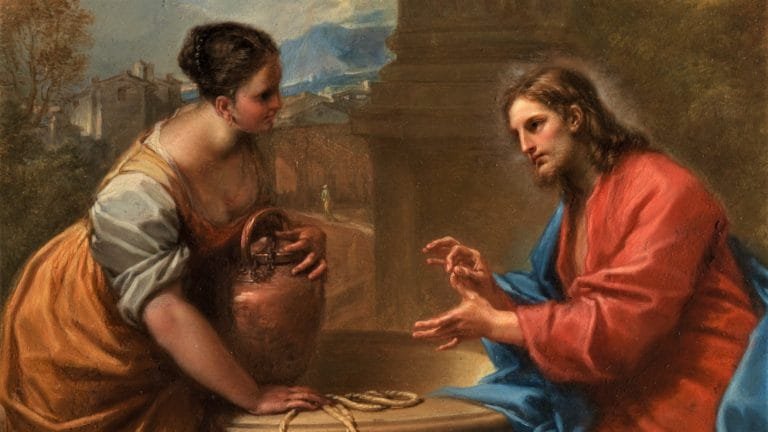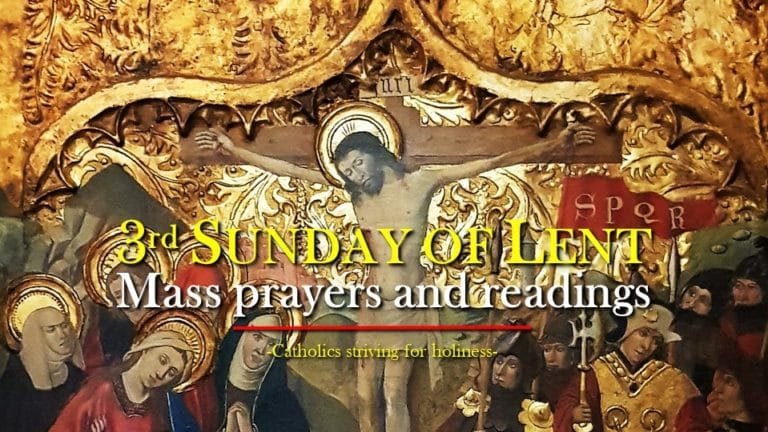POPE FRANCIS’ REFLECTION ON THE THIRD SUNDAY OF LENT YEAR A

ANGELUS
Saint Peter’s Square
Third Sunday of Lent Year A, 12 March 2023
______________________________________
Dear brothers and sisters, buongiorno, good Sunday!
This Sunday, the Gospel presents us one of the most beautiful and fascinating encounters Jesus has – the one with the Samaritan woman (cf. Jn 4:5-42). Jesus and his disciples take a break near a well in Samaria. A woman arrives and Jesus says to her, “Give me a drink” (v. 8). I would like to pause specifically on this expression: Give me a drink.
This scene depicts Jesus, thirsty and tired. A Samaritan woman finds him at the hottest hour, at midday, asking for refreshment like a beggar. It is an image of God’s abasement. God lowers himself in Jesus Christ for our redemption. He comes to us. In Jesus, God made himself one of us, he lowered himself. Thirsty like us, he suffers our same thirst. Thinking about this scene, each one of us can say: the Lord, the Teacher, “asks me for a drink. So, he is thirsty like me. He shares my thirst. You are truly near me, Lord! You are in touch with my poverty.” But I can’t believe it! “You have grasped me from below, from the lowest part of myself, where no one reaches me” (P. Mazzolari, La Samaritana, Bologna 2022, 55-56). And you have come to me from below and you have grasped me from below because you were thirsting and thirst for me. In fact, Jesus’ thirst is not only physical. It expresses the deepest thirsts of our lives, and above all, a thirst for our love. He is more than a beggar. He “is thirsty” for our love.And this will emerge at the culminating moment of his passion, on the cross, where, before dying, Jesus will say: “I thirst” (Jn 19:28). That thirst for love brought him to descend, to lower himself, to abase himself, to be one of us.
But the Lord who asks for a drink is the One who gives to drink. Meeting the Samaritan woman, he speaks to her about the Holy Spirit’s living water. And from the cross, blood and water flow from his pierced side (cf. Jn 19:34). Thirsty for love, Jesus quenches our thirst with love. And he does with us what he did with the Samaritan woman – he comes to meet us in our daily life, he shares our thirst, he promises us living water that makes eternal life well up within us.
Give me a drink. There is a second aspect. These words are not only a request from Jesus to the Samaritan woman, but a cry – silent at times – that meets us every day and asks us to slake someone else’s thirst, to take care of someone else’s thirst.How many say ‘give me a drink’ to us – in our family, at work, in other places we find ourselves. They thirst for closeness, for attention, for a listening ear. People say it who thirst for the Word of God and need to find an oasis in the Church where they can drink. Give me a drink is a cry heard in our society, where the frenetic pace, the rush to consume, and especially indifference, that culture of indifference, generate aridity and interior emptiness. And – let us not forget this – ‘give me a drink’ is the cry of many brothers and sisters who lack the water to live, while our common home continues to be polluted and defaced. Exhausted and parched, she too “is thirsty”.
Before these challenges, today’s Gospel offers living water to every one of us who can become a refreshing spring for others. And so, like the Samaritan woman who leaves her jug at the well and went to call the people of her village (cf. v. 28), we too will no longer only think of slaking our own thirst, our material thirst, our intellectual or cultural thirst, but with the joy of having met the Lord, we will quench others’ thirst, giving meaning to someone else’s life, not as masters, but as servants of that Word of God who has thirsted for us, who continually thirsts for us. We will understand their thirst and share the love he has given to us. A question to ask myself and all of you is coming to: Are we able to understand the thirst of others, the thirst people have, the thirst so many in my family, in my neighbourhood have ?Today, we can ask ourselves: Do I thirst for God? Am I aware that I need his love like water to live? And then: I who am thirsty, am I concerned about the thirst of others, their spiritual thirst, their material thirst?
May Our Lady intercede for us and sustain us on the way.
Source: https://www.vatican.va/content/francesco/en/angelus/2023/documents/20230312-angelus.html
EMPHASIS ADDED.
ANGELUS
Library of the Vatican Apostolic Palace
Sunday, 15 March 2020

Dear Brothers and Sisters, Good Morning!
At this moment the Mass for the sick, doctors, nurses and volunteers, that is being celebrated by the Archbishop [Mario Delpini] in Milan’s Policlinico (hospital) is coming to an end. The Archbishop is close to his people and also close to God in prayer. Last week’s photograph of him alone on the roof of the Duomo, praying to Our Lady comes to mind. I would also like to thank all the priests, the creativity of priests. A lot of news of this creativity has been reaching me from the Region of Lombardy. It is true that Lombardy has been highly affected. There are priests who think of thousands of ways to be close to the people, so that the people do not feel abandoned; priests with apostolic zeal, who have fully understood that during this time of pandemic, one must not be like “Don Abbondio” (character from The Betrothed). Many thanks to you priests.
The Gospel passage from today, the Third Sunday of Lent, tells us of Jesus’ meeting with a Samaritan woman (cf. Jn 4:5-42). He is on a journey with his disciples and takes a break near a well in Samaria. The Samaritans were considered heretics by the Jews, and were very much despised as second-class citizens. Jesus is tired, thirsty. A woman arrives to draw water and he says to her: “Give me a drink” (v. 7). Breaking every barrier, he begins a dialogue in which he reveals to the woman the mystery of living water, that is, of the Holy Spirit, God’s gift. Indeed, in response to the woman’s surprised reaction, Jesus says: “If you knew the gift of God and who is saying to you, ‘Give me a drink’, you would have asked him and he would have given you living water” (v. 10).
Water is the focus of this dialogue. On the one hand, water is an essential element that slakes the body’s thirst and sustains life. On the other, water is a symbol of divine grace that gives eternal life. In the biblical tradition God is the source of living water: as it says in Psalms and in the Prophets: distancing oneself from God, the source of living water, and from his Law, leads to the worst drought. This is the experience of the People of Israel in the desert. During their long journey to freedom, as they were dying of thirst, they cried out against Moses and against God because there was no water. Thus, God willed Moses to make water flow from a rock, as a sign of the Providence of God, accompanying his people and giving them life (cf. Ex 17:1-7).
The Apostle Paul, too, interprets that rock as a symbol of Christ. He says: “And that rock was Christ” (cf. 1 Cor 10:4). It is the mysterious figure of his presence in the midst of the People of God on their journey. Christ, in fact, is the Temple from which, according to the prophets, flows the Holy Spirit, the living water which purifies and gives life. Whoever thirsts for salvation can draw freely from Jesus, and the Spirit will become a wellspring of full and eternal life in him/her. The promise of living water that Jesus made to the Samaritan woman becomes a reality in his Passion: from his pierced side flowed “blood and water” (Jn 19:34). Christ, the Lamb, immolated and risen, is the wellspring from which flows the Holy Spirit who remits sins and regenerates new life.
This gift is also the source of witness. Like the Samaritan woman, whoever personally encounters the living Jesus feels the need to talk about him to others, so that everyone might reach the point of proclaiming that Jesus “is truly the saviour of the world” (Jn 4:42), as the woman’s fellow townspeople later said. Generated to new life through Baptism, we too are called to witness the life and hope that are within us. If our quest and our thirst are thoroughly quenched in Christ, we will manifest that salvation is not found in the “things” of this world, which ultimately produce drought, but in he who has loved us and will always love us: Jesus, our Saviour, in the living water, that he offers us.
May Mary, Most Holy, help us nourish a desire for Christ, font of living water, the only one who can satisfy the thirst for life and love that we bear in our hearts.
Source: https://www.vatican.va/content/francesco/en/angelus/2020/documents/papa-francesco_angelus_20200315.html
EMPHASIS ADDED.

ANGELUS
Saint Peter’s Square
Third Sunday of Lent Year A, 19 March 2017
Dear Brothers and Sisters, Good morning!
The Gospel for this Third Sunday of Lent presents Jesus’ dialogue with the Samaritan woman (cf. Jn 4:5-42). The encounter takes place as Jesus is crossing Samaria, a region between Judea and Galilee inhabited by people whom the Hebrews despised, considering them schismatic and heretical. But this very population would be one of the first to adhere to the Christian preaching of the Apostles. While the disciples go into the village to buy food, Jesus stays near a well and asks a woman for a drink; she had come there to draw water. From this request a dialogue begins. “How is it that you, a Jew, ask a drink of me, a woman of Samaria?”. Jesus responded: If you knew who I am, and the gift I have for you, you would have asked me for and I would have given you “living water”, a water that satisfies all thirst and becomes a boundless spring in the heart of those who drink it (cf. vv. 9-14).
Going to the well to draw water is burdensome and tedious; it would be lovely to have a gushing spring available! But Jesus speaks of a different water. When the woman realizes that the man she is speaking with is a prophet, she confides in him her own life and asks him religious questions. Her thirst for affection and a full life had not been satisfied by the five husbands she had had, but instead, she had experienced disappointment and deceit. Thus, the woman was struck by the great respect Jesus had for her, and when he actually spoke to her of true faith as the relationship with God the Father “in spirit and truth”, she realized that this man could be the Messiah, and Jesus does something extremely rare — he confirms it: “I who speak to you am he” (v. 26). He says he is the Messiah to a woman who had such a disordered life.
Dear brothers and sisters, the water that gives eternal life was poured into our hearts on the day of our Baptism; then God transformed and filled us with his grace. But we may have forgotten this great gift that we received, or reduced it to a merely official statistic; and perhaps we seek “wells” whose water does not quench our thirst. When we forget the true water, we go in search of wells that do not have clean water. Thus this Gospel passage actually concerns us! Not just the Samaritan woman, but us. Jesus speaks to us as he does to the Samaritan woman. Of course, we already know him, but perhaps we have not yet encountered him personally. We know who Jesus is, but perhaps we have not countered him personally, spoken with him, and we still have not recognized him as our Saviour. This Season of Lent is a good occasion to draw near to him, to counter him in prayer in a heart-to-heart dialogue; to speak with him, to listen to him. It is a good occasion to see his face in the face of a suffering brother or sister. In this way we can renew in ourselves the grace of Baptism, quench our thirst at the wellspring of the Word of God and of his Holy Spirit; and in this way, also discover the joy of becoming artisans of reconciliation and instruments of peace in daily life.
May the Virgin Mary help us to draw constantly from grace, from the water that springs from the rock that is Christ the Saviour, so that we may profess our faith with conviction and joyfully proclaim the wonders of the love of merciful God, the source of all good.
Source: https://www.vatican.va/content/francesco/en/angelus/2017/documents/papa-francesco_angelus_20170319.html
EMPHASIS ADDED.

ANGELUS
Saint Peter’s Square
Third Sunday of Lent Year A, 23 March 2014
Dear Brothers and Sisters, Good morning!
Today’s Gospel presents Jesus’ encounter with the Samaritan woman in Sicar, near an old well where the woman went to draw water daily. That day, she found Jesus seated, “wearied as he was with his journey” (Jn 4:6). He immediately says to her: “Give me a drink” (v. 7). In this way he overcomes the barriers of hostility that existed between Jews and Samaritans and breaks the mould of prejudice against women. This simple request from Jesus is the start of a frank dialogue, through which he enters with great delicacy into the interior world of a person to whom, according to social norms, he should not have spoken. But Jesus does! Jesus is not afraid. When Jesus sees a person he goes ahead, because he loves. He loves us all. He never hesitates before a person out of prejudice. Jesus sets her own situation before her, not by judging her but by making her feel worthy, acknowledged, and thus arousing in her the desire to go beyond the daily routine.
Jesus’ thirst was not so much for water, but for the encounter with a parched soul. Jesus needed to encounter the Samaritan woman in order to open her heart: he asks for a drink so as to bring to light her own thirst. The woman is moved by this encounter: she asks Jesus several profound questions that we all carry within but often ignore. We, too, have many questions to ask, but we don’t have the courage to ask Jesus! Lent, dear brothers and sisters, is the opportune time to look within ourselves, to understand our truest spiritual needs, and to ask the Lord’s help in prayer. The example of the Samaritan woman invites us to exclaim: “Jesus, give me a drink that will quench my thirst forever”.
The Gospel says that the disciples marvelled that their Master was speaking to this woman. But the Lord is greater than prejudice, which is why he was not afraid to address the Samaritan woman: mercy is greater than prejudice. We must learn this well! Mercy is greater than prejudice, and Jesus is so very merciful, very! The outcome of that encounter by the well was the woman’s transformation: “the woman left her water jar” (v. 28), with which she had come to draw water, and ran to the city to tell people about her extraordinary experience. “I found a man who told me all that I ever did. Can this be be the Christ?” She was excited. She had gone to draw water from the well, but she found another kind of water, the living water of mercy from which gushes forth eternal life. She found the water she had always sought! She runs to the village, that village which had judged her, condemned her and rejected her, and she announces that she has met the Messiah: the one who has changed her life. Because every encounter with Jesus changes our lives, always. It is a step forward, a step closer to God. And thus every encounter with Jesus changes our life. It is always, always this way.
In this Gospel passage we likewise find the impetus to “leave behind our water jar”, the symbol of everything that is seemingly important, but loses all its value before the “love of God”. We all have one, or more than one! I ask you, and myself: “What is your interior water jar, the one that weighs you down, that distances you from God?”. Let us set it aside a little and with our hearts; let us hear the voice of Jesus offering us another kind of water, another water that brings us close to the Lord. We are called to rediscover the importance and the sense of our Christian life, initiated in Baptism and, like the Samaritan woman, to witness to our brothers. A witness of what? Joy! To witness to the joy of the encounter with Jesus; for, as I said, every encounter with Jesus changes our life, and every encounter with Jesus also fills us with joy, the joy that comes from within. And the Lord is like this. And so we must tell of the marvellous things the Lord can do in our hearts when we have the courage to set aside our own water jar.
Source: https://www.vatican.va/content/francesco/en/angelus/2014/documents/papa-francesco_angelus_20140323.html
EMPHASIS ADDED.
SEE AS WELL:
Stay updated: subscribe by email for free TO OUR NEW WEBSITE www.catholicsstrivingforholiness.org (PUT YOUR EMAIL IN THE SUBSCRIBE WIDGET).
We are also in www.fb.com/Catholicsstrivingforholiness. Kindly help more people in their Christian life by liking our page and inviting your family, friends and relatives to do so as well. Thanks in advance and God bless you and your loved ones! Fr. Rolly Arjonillo


